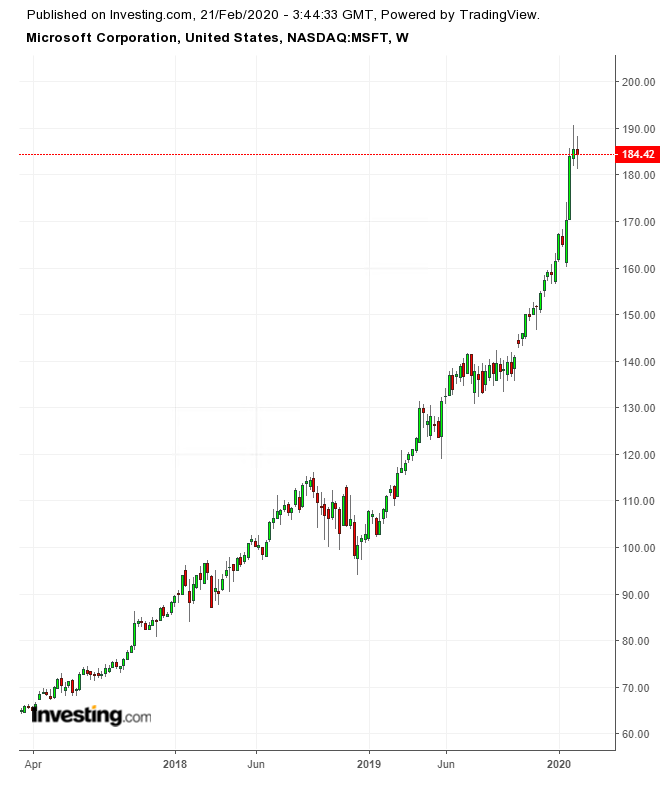Shares of global technology giant Microsoft (NASDAQ:MSFT) had a great run in 2019. Investors sent the stock soaring after seeing explosive growth in sales. This built strong expectations for additional gains this year.
Currently the world's most highly valued company, with a market cap of $1.4-trillion, Microsoft shares have already surged about 18% during the first seven weeks of 2020, after having delivered returns of about 60% to shareholders in 2019. The stock closed yesterday at $184.42, a bit below the all-time high of $190.7 reached on Feb. 11.

This rally in Microsoft shares—which began in the middle of 2016—is showing no sign of peaking as the Redmond, WA-based software giant benefits from the expanding demand for its cloud-computing services.
Following a massive transformation spearheaded by Chief Executive Satya Nadella, which started more than five years ago, Microsoft has become one of the most powerful players in the fast-growing cloud-computing market, commanding the segment's second largest market share, with only Amazon (NASDAQ:AMZN) ahead.
When he became the company's CEO in early 2014, Nadella began diversifying Microsoft’s revenue away from its traditional growth engines — Windows and Office. The company invested heavily in data centers and other infrastructure to help corporate customers run applications and store information. The growth in this segment continues unabated. In the four quarters to Dec. 31, Microsoft’s profit has more than doubled.
But that relentless rally in Microsoft shares also leaves investors wondering whether it’s a good time to buy this top-performing stock? Despite a strong bullish trend backed by robust fundamentals, some investors are concerned that tech stocks in general have moved too far, too fast, especially in the wake of the coronavirus outbreak in China and its spread globally, which just yesterday was a catalyst for the tech sector sellof on Wall Street.
10% Market Correction?
Goldman Sachs told clients this week that a near-term correction, in which the market slides at least 10% from a recent peak, "is looking much more probable,” as equities look "increasingly exposed" to disappointing earnings growth due to the Covid-19 outbreak.
In addition, China plays a central role in the global manufacturing supply chain, making many technology companies vulnerable. Just about every major piece of consumer electronics is made there, from iPhones (NASDAQ:AAPL) and gaming consoles to half the world’s liquid crystal display (LCD) screens.
“'We believe the greater risk is that the impact of the coronavirus on earnings may well be underestimated in current stock prices, suggesting that the risks of a correction are high," said Goldman analyst Peter Oppenheimer, in a note.
Indeed, Apple Inc. shares fell on Tuesday, after the company said the fallout from the coronavirus would cause it to miss its sales targets this quarter. But unlike Apple which generates about 20% of its sales from China, Microsoft garners only 1.8% of its global revenue from the Asian nation.
Aside from these short-term risks, executives at Microsoft are quite positive about future earnings growth. Gross margins for the commercial cloud business, which includes Azure computing services and Office 365 applications, expanded to 67% in the fourth-quarter. And while margins for the business rose for a fourth-consecutive quarter, on a conference call last month, executives told analysts that figure should continue to rise this year.
Its rock-solid dividend and excellent track record on payouts adds to the appeal of Microsoft as an attractive investment, particularly during an uncertain economy. Since 2004, when the tech giant first began paying a dividend, its payout has swelled more than four-fold. Microsoft's current annual dividend yield is 1.09% with a quarterly dividend of $0.51 per share.
Of course companies that pay reliable dividends are in a much better position to withstand selling pressure than those that don’t, making them less volatile in a bear market since they provide guaranteed, recurring income to shareholders.
Bottom Line
As investors remain jittery about the global economic outlook in the aftermath of coronavirus, yesterday's correction in the leading tech stocks, including Microsoft, wasn't be surprising. But that weakness should offer a buying opportunity. Microsoft's fundamentals make it a safe long-term bet in the tech space.
